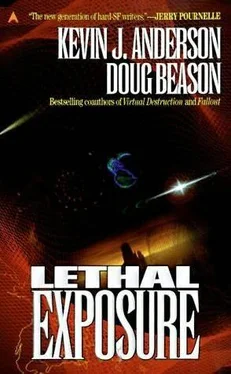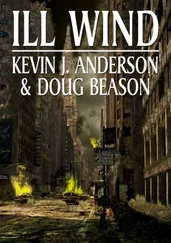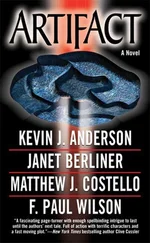Both agents burst into the room, handguns drawn and looking for targets. “Don’t move!” Jackson shouted.
Craig saw a figure duck through the smashed open window and land with a loud clang on the fire escape. “There he goes!” Craig said.
But before he could turn, they encountered a thick, billowing wall of greenish-yellow smoke gushing into the small room. Noxious fumes belched from a bucket on the kitchen floor like deadly exhaust.
Without thinking, Craig gasped a deep breath and inhaled the gas. It felt as if someone had exploded firecrackers in his lungs. His eyes were on fire; his nostrils burned. He choked, staggering back. “ Jackson, get-” He coughed and spluttered.
Enveloped by the greenish-yellow smoke, Jackson fell to his knees. Craig knew it was homemade chlorine gas, the kind used against American troops in World War I. Any first-year chemistry student knew how to make such a weapon from household chemicals. In the confined kitchen area, the gas was strong enough to overwhelm both men instantly.
Unable to breathe, Craig dropped to the floor himself, seeking cleaner air. Jackson collapsed beside him, wheezing. Like a distant hallucination he heard footsteps clanging down the fire escape and running away.
Desperately, Craig dragged himself toward the broken window and fresh air. He gulped in gasps that still reeked of chlorine but at least caused no further damage to his seared lungs.
The gas clouds clustered at the ceiling, making the paint blister.
Jackson wasn’t moving, though, and so Craig turned back, grabbing his partner’s collar, dragging him by the arms toward the air. Reaching out with one spasming hand, Craig fumbled with the back door, trying to turn the deadbolt. Finally, he succeeded in cracking open the porch door, which led out onto the wrought-iron balcony.
Craig and Jackson huddled by the door, trying to draw in deep breaths, but each gasp burned. Craig’s lungs were ablaze, as if he had breathed in the acid that had been used to destroy Dumenco’s computer. Jackson retched and coughed beside him, incapacitated. Craig raised his head to the window, took another huge gulp of fresh air.
On the other side of the building, he heard a car start, then drive off. Their attacker had escaped, but Craig couldn’t continue the pursuit. He slumped back, struggling just to remain conscious.
Wednesday, 4:33 p.m.
Bangalore, India
Nicholas Bretti did not loosen his grip on his airline seat until the small plane had landed safely at the Bangalore airport. He wondered if he ever relax again, ever sleep without nightmares, would ever stop jumping and twitching at every little unexpected sound.
It wasn’t likely to happen any time soon.
Exactly two hours after leaving Mr. Ambalal and the Liberty for All party in New Delhi-fifteen hours after taking off from O’Hare in Chicago, and less than a day after shooting an FBI agent-Bretti was sober and ready to meet the people who had paid his bills over the past year. He had to make this good, or else they would never help him out of this mess. What other choice did he have?
He worried that his reception in Bangalore would be no different from what he had experienced in New Delhi. Despite the $25,000 he had already pocketed, he was beginning to wonder if Chandrawalia would make good on his promise to come through with the rest of the money.
Twenty-five grand-a year’s salary. Was that enough for the hell he had gotten himself into? Shit, no. Now it was up to the Indian government to salvage the situation, but he had no idea if they would be sympathetic.
Exiting the jet ramp into the terminal, Bretti was mobbed by a dozen children. They swarmed around him, plunging their hands into his pockets, searching for coins and jabbering the only English phrases they knew, “Please give, sir! Please give!”
Scents of incense and curry mixed with the pungent odor of unwashed bodies. Unprotected by the buffer of a customs area this time, Bretti fought his way through an ever-shifting mob toward the airport exit.
The terminal building bustled with people, some wearing sarongs, others, like the children around him, in shorts and dirty white T-shirts. He saw men, women, boys… but there were no little girls in sight. Maybe the families kept them locked up somewhere.
A cackling chicken flew into the air as a family tried to stuff it back into a cage at the check-in counter. A dark-robed old woman with a small gold stud through her nose and a red mark on her forehead, clutched a baby goat to her breast.
Fifty feet away by the outside door, a man wearing a black-and-yellow splotched shirt held up a sign, Bretti. Bretti made eye contact with the man, who waved for him to follow. “Here, sir!”
Bretti pushed through a forest of chattering, begging children. They all tried to touch him, all pleaded for his help. Bretti felt one hand slip into his back pocket. Grabbing a slender wrist, Bretti whirled the young pickpocket around, keyed up and angry from his long tension.
With wild black hair and a dirty face, the boy could not have been older than ten. He laughed as Bretti held him up by his arm; the boy dangled in front of the other children and tried to swipe at Bretti with his free hand.
Before Bretti could admonish the pickpocket, another hand clawed at the back of his pants. Bretti threw the boy backward, bowling over two other children behind him. He knocked the prying hands away. “Get out of here, you little bastards!” He shouted, and the kids howled with laughter.
Bretti pushed his way through the crowd, paying no attention to who he ran into or pushed out of the way.
He kept a free hand on his wallet. The crowd parted as he shoved through.
The man with the sign waved out the door. He smiled beneath a scrawny mustache. “This way, please, sir.” He disappeared from sight.
Bretti pushed out of the crowded building toward a dark blue sedan with tinted windows. A driver wearing a black British polo cap stood beside the long car. When he saw Bretti, he opened the car door.
The humid air still stank outside the terminal, but at least there were fewer people. Bretti strode toward the car, his skin crawling from the overpowering crowds. The driver opened the door, and Bretti dove into the luxury of the air-conditioned interior. As he relaxed back into the seat, someone pounded at the tinted window. It was the first boy who had tried to lift his wallet. The boy and two of his friends pressed their faces against the tinted window, trying to look in. They hammered with their fists, then pressed their tongues against the window, leaving long, slimy wet spots.
The man with the sign slipped into the car’s front seat, and the driver pulled out immediately, oblivious to the children, the crowds, or any other obstacle. The first man turned and grinned. “Welcome to India, Dr. Bretti. How was your flight?‘’
“ Mr . Bretti,” he said sourly. The car moved slowly through road construction as they left the airport. “I have an important package in a diplomatic pouch-”
“We have made arrangements for it to be delivered, sir. Only the very best for your visit. The Sikander Lodi Research Center is only a short drive from here. You are to meet with the scientific staff before going to the Regency Hotel. Very nice accommodations-four-star.”
“Great,” muttered Bretti. “Four-star.” He dreaded finding out what the Indians meant by that.
Looking through the saliva-streaked window, he spotted a gleaming, arrow-straight building that rose a hundred feet into the air, as modern as anything he would find in Chicago… but it was surrounded by dilapidated shacks that swarmed with pigs, chickens, and scrawny dogs. Barefoot men sat on their haunches smoking cigarettes while men in expensive suits hurried past them into the skyscraper. It was a comedy of extremes, an excess of dissonance. Two young men urinated openly against another ultra-modern building.
Читать дальше












